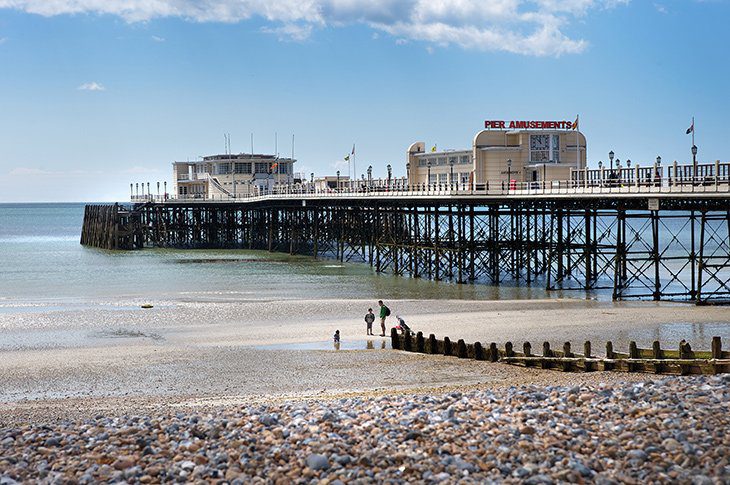“Nostalgia is a senility illness“. But recalling one’s past, relocating past friends – thanks to Facebook – is a stimulating and enlightening experience when reviewed with the experience of a lifetime in radio and television.
This has occured this very last week when I added a personal note on a Facebook page mentionning Sun Radio, a land-based pirate radio station that operated between 1969-1973 from Worthing along the Sussex coast from Brighton. I added: “I did a couple de shows on Sun Radio when I was a student at Sussex University. It was run by a guy called Chris ? I have forgotten my pseudo“.
And the response from Chris Evans, himself, was to lead to a batch of memories, leading to this article: “Hi Martin. your pseudo was “Martin Dean” but you generally self id as simply “Martin”. I was only part of a team that ran Sun but thanks for the ‘big up’. Two of your shows survive in the Sun audio archive. Hope you are keeping well.“
Gee! Finding perhaps the very first radio programme that I hosted – (or as we said at the time ‘dejayed’) and which was broadcast well before I joined the BBC’s local radio station in Brighton was an enormous surprise. Exchanges with Chris led to two archive recordings of me, alias “Martin Dean” playing the hits on Easter Sunday 13-14hrs on 29th March 1970. and the following bank holiday Monday. [The complete recordings at the close of this post.]
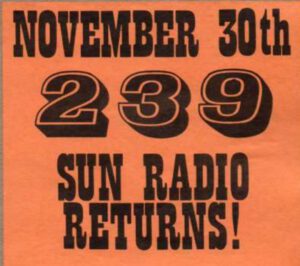
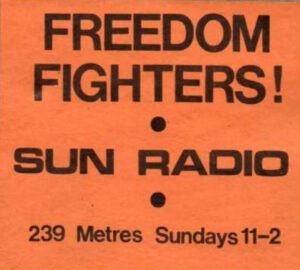
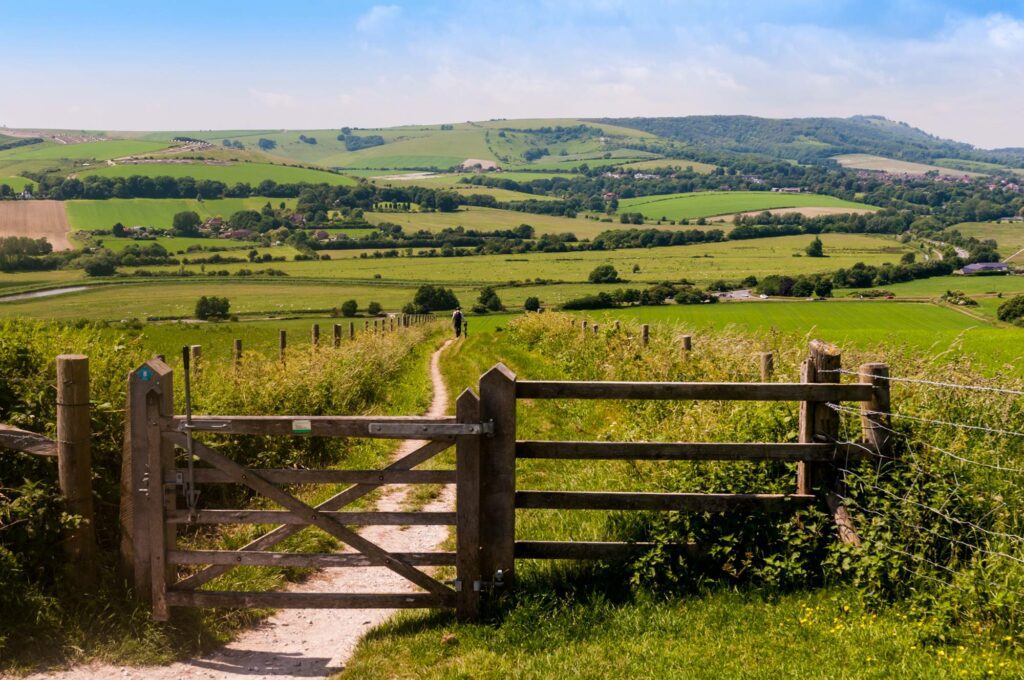
If one does a Google search on “Sun Radio Worthing”, one doesn’t expect to find much that is topical. Going back so far in time on the Internet is not very productive. But the search does come up with some “official” information, drawn from The National Archives.
“Reference: HO 255/1188 – Sun Radio, Worthing, UK: illicit radio transmission station: investigation by Post Office Radio Branch Officers. Date: 1969-1973”
Yes, we were pirates of the airwaves, extremely frustrated after the closure of the offshore radio stations, that independant local radio was not being legalised in Britain. Freedom was a constant lightmotif.
The first officially approved independant radios LBC-IRN and Capital Radio in London did not open until 1973. And until then there was but the BBC monopoly. Incuding BBC Radio Brighton which I joined as a freelance journalist at the end, I think, of 1970.
In fact there was probably an overlap between the days I contributed to Phil Fothergill’s “pop” programmes on Radio Brighton. And the jingles I produced for “Martin Dean” were probably recorded, without SUN Radio being aware, in clandestine night-sessions at the Beeb station. No other friends of those same years (Graham, Merbie, Mike, Mel… were involved in the clandestine programmes on Sun Radio. But we were certainly all of the same spirit, eagerly editing demo tapes of US “PAMs” jingles. I still have a dozen or so boxes of such tape demos.
[On one of my personal jingles I recognise the voice of Ric Davies, a strong american accent student friend at Sussex University. He did some shows under a SUN radio alias of “Ron Saywell”. He later became a journalist on America’s WABC in New York.
Listening to these recordins of myself behind a microphone 52 years ago, I reacted : “I had a lot of voice projection, or ‘punch’ which I find surprising. We were pretending to be super jocks like the offshore djs“.
Chris has filled in with some context about the style of Sun Radio: “Great ,yes that was the intention to try at least to emulate the” best “of the offshore sound which in turn was based on Gordon McLendon’s KLIF (Dallas) which in turn had drawn on the programming of earlier Top Forty /Color Radio pioneers such as Todd Storz, Chuck Blore, Bill Drake et al. Sun basically went through 3 main presentation/branding styles. Your time with Sun was, basically version 2.2., it was intestinally “clutter radio”. This format ran until June 70. Version 3 launched in August 70 was rather different. It was a blend of Drake’s Boss Radio format (KHJ Los Angles) and the “Good Guys” format ,calling ourselves “Super Sun, the sound of Home Town Radio” or similar! The number of station jingles was drastically reduced, personalised jingles/drop ins, such as those you so well crafted , were dropped and we pulled right back on voice projection. News presentation was de-cluttered, zaps, bleeps. mainly gone. Sadly as far as I know no recordings of this programming format survive but some of the jingles/audio branding are still extant. The Good Guys is a very difficult concept to pull off, especially if you are a Top Forty pirate! It is said that the only Top Forty station to pull it off and go to the top of the ratings book was WMCA (New York) under the legendary Ruth Meyer“.
Note : such an analysis today after so many years clearly demonstrates how strong an impact these early years had on Chris : on us all.
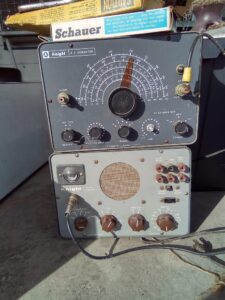
Our passion for radio: for instance as fans of Radio Caroline and other offshore stations, for sliding the ‘pot’ open and talking behind a microphone, and for playing records (note : I ran the Sussex University’s disco), also stemmed from a great interest in the technical aspects of broadcsating and electronics.
I had before going to university, built my own FM transmitter which broadcast “Radio Martin International” to the Wimbledon district where I lived. Other example : Just remember Mel’s career after Radio Nordzee, his company equiping and installing audio mixing consoles for radio stations.
Below : Two complet “Martin Dean” shows for Sunday 29th March 1970 and the following Monday bank Holiday, each – beware – one hour long.
SUN Radio operations involved pre-recording programmes and rebroadcasting the cassettes from a variety of locations, mostly houses, and rarely from a vehicle. The “Scouts” members of the team were on a constant vigil to identify vehicles of possible officials trying to hunt them down and seize the SUN radio transmitter.
I understand that those involved in SUN Radio have never compiled a complete official history of the station’s activities.
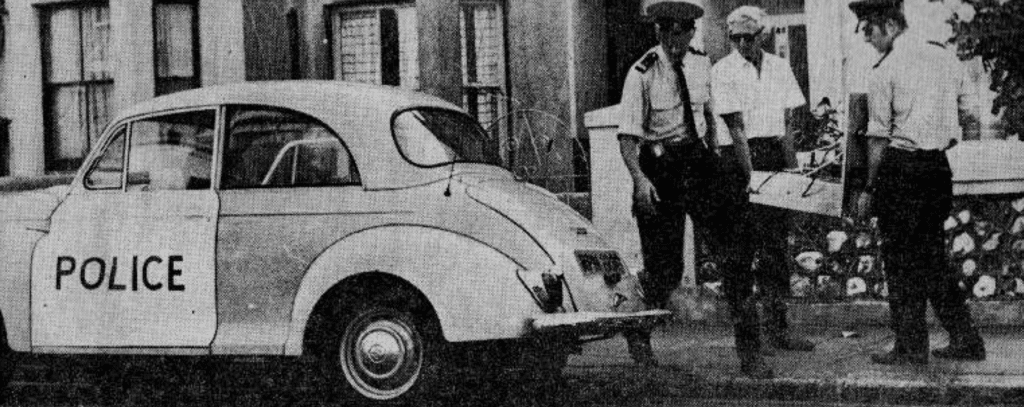
Final thoughts. Adding to these very first steps in radio as a career, I must mention my participation as a close friend of “RLU Radio London UnderGround” (another land pirate but with a total diffrent style of programming) and its principal actor Richard Elen, recently re-discovered again via Facebook.
The technical aspects of this activity were prolonged: first at Sussex University where I created the On-Camus closed-TV network with fellow student Barry Jackson (‘R.I.P’), then my freelance contributions to the BBC Brighton student’s programme ‘Contact’ (with producer Chris Walmsley R.I.P), and as Secretary of the Students Union the editing and publishing of the students paper. Not forgeting my work editing and producing material for Paul Hollingdale‘s syndication company.
Just over a year as a freelancer in the BBC Newsroom (under editor Tony Talmage), I joined LBC London Broadcasting Company, producing the ‘AM early morning show for three years. I had forgotten, but Chris Evans reminds me that at the same time he also worked in the Sales & Production department at LBC’s Gough Square. With a financial crisis at LBC I then emigrated to France, and for over ten years was a foreign correspondent for Independant Radio News.
The last part of my professional life has also essentially been linked to radio communication in a wider sense: in the space sector, doing commentaries for Arianespace launches from French Guiana, and as part of the Science Communication effort of the European Space Agency. In these areas I have produced countless web articles and videos dealing with the human and technical aspects of many missions, simplified for a wider public understanding and featuring the personal characters of their enginers and scientists. [see other articles on this site].
But turning the clock back 52 years and keeping one essential comparison : my voice in later years has been much more subdued and “classically British” than those shows on Sun Radio. Yeah, man, hit it, Groove on!
Updated/maj. 08-11-2022
Vues : 57

